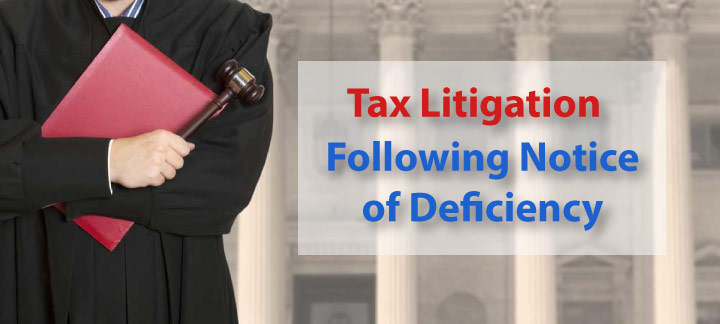Tax Litigation Following the Notice of Deficiency
Receiving a statutory notice of deficiency is a turning point for the taxpayer’s tax litigation case. The IRS cannot collect tax unless the tax has been assessed, and no assessment can be made on a tax until a valid statutory notice of deficiency has been issued by the Service. Once the taxpayer receives a statutory notice of deficiency, there are three options available:
- The taxpayer may contest the amount of the deficiency by filing a petition for redetermination in the Tax Court;
- The taxpayer may pay the tax and file a claim for a refund contesting the deficiency. Assuming the refund claim is disallowed, the taxpayer may then file a refund action in the district court or United States Court of Federal Claim; or
- The taxpayer may agree to the deficiency and allow the IRS to assess and collect the tax asserted in the deficiency notice.
What are the Procedural Consequences of a Statutory Notice of Deficiency in Tax Litigation?
The statutory notice of deficiency can trigger three important procedural consequences. The most noteworthy consequence of the mailing of the statutory notice of deficiency is that is triggers the 90-day time period during which the taxpayer may file a petition for redetermination in the Tax Court. This is significant because the Tax Court completely lacks jurisdiction over a redetermination action without the existence of the statutory notice of deficiency. A second consequence of the mailing of the statutory notice of deficiency is that it suspends and tolls certain statutes of limitation. The statutes of limitation contained in IRC § 6501 and 6502 relate to the assessment and collection of tax deficiencies covered under the 90-day letter. When the statutory notice of deficiency is mailed, these statutes of limitation are tolled for the filing of a Tax Court petition for redetermination and for 60 days thereafter. If the taxpayer chooses to file a petition for redetermination in Tax Court, the period of limitations for the IRS to make an assessment and collection is tolled until 60 days after the final decision of the Tax Court.
A Statutory Notice of Deficiency Must be Valid
Because the statutory notice of deficiency is defined by statute, the IRS must satisfy certain requirements in order to issue a valid notice of deficiency. The first requirement is that the Commission must asset a deficiency as defined under IRC § 6211(a) for the taxpayer’s taxable period in issue. Next, the IRS must make a determination concluding that the deficiency actually exists. Finally, the statutory notice of deficiency must be transmitted to the taxpayer before the expiration of the statute of limitations for assessment. All three of these requirements must be present for the statutory notice of deficiency to be valid.
If the statutory notice of deficiency is not valid, the taxpayer has certain options. Where the taxpayer believes that the statutory notice of deficiency is invalid, he or she may file a petition in the Tax Court contesting the jurisdiction of the court based on invalid notice. Another option in this situation is that the taxpayer may first pay the deficiency and contest the validity of the notice by filing a refund action in the district court or Court of Federal Claims. If the taxpayer succeeds in either motion, then the IRS will be precluded from issuing a second, proper statutory notice of deficiency against the taxpayer and assessing the deficiency amount. Thus, the issuance of the statutory notice of deficiency is of paramount important in tax litigation. Tax attorneys and their clients should be on the lookout for invalid notices of deficiencies and consider all options before proceeding.
How a Tax Attorney Can Help with Your Tax Litigation
If you are contemplating a deficiency litigation, then you must consult with an experienced tax attorney. San Diego Tax Attorney William D. Hartsock has been successfully helping clients with tax issues since the early 1980s. Mr. Hartsock offers free consultations with the full benefit and protections of attorney client privilege to help people clearly understand their situation and options based on the circumstances of their case. To schedule your free consultation simply fill out the contact form found on this page, or call (858) 481-4844.



Comments (0)